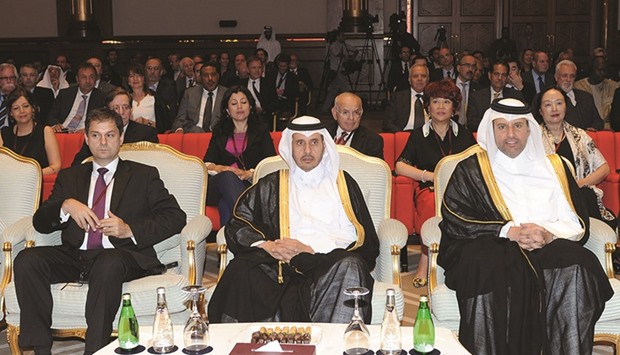Qatar’s gross domestic product (GDP) is projected to achieve a stable growth of about 4.3% this year, according to HE the Minister of Economy and Commerce Sheikh Ahmed bin Jassim bin Mohamed al-Thani.
Speaking at the opening of the Enriching the Middle East’s Economic Future Conference yesterday, the minister praised the conference’s role in providing an opportunity for participants to exchange views and discuss issues of interest to the people and countries of the Middle East.
Given the present circumstances in the global economy and in light of fluctuations in oil prices along with declining growth rates in world’s major economies, the minister said that concerted efforts were required to establish a knowledge-based and dedicated culture of innovation in the Middle East.
He said that “under the wise guidance of HH the Emir Sheikh Tamim bin Hamad al-Thani, Qatar has been working on the consolidation of imparting knowledge in various areas, in economic sector in particular, by pursuing flexible policies to diversify the sources of income and to keep pace with Qatar National Vision 2030”.
He highlighted that Qatar placed the private sector and innovation at the forefront of strategic priorities by implementing a set of programmes and policies to strengthen integration among various state authorities and enshrining the principle of meaningful and constructive partnership with the private sector.
HE Sheikh Ahmed said that these efforts reflected Qatar’s ranking in international reports and indicators as the 2015-2016 Global Competitiveness Report issued by the World Economic Forum ranked the State of Qatar first among
Arab countries and 14th globally.
He said that Qatar occupied the first position globally in terms of ease of access to loans and placed its stable macroeconomic environment in the second position, along with a very high level of physical security as it ranked 4th.
“All these indicators are the best proof of the successful economic policies and contributed directly to the promotion of Qatar’s competitive economy,” he said.

HE the Prime Minister and Minister of Interior Sheikh Abdullah bin Nasser bin Khalifa al-Thani attending the opening of the Enriching the Middle East’s Economic Future Conference at Sheraton Doha Hotel.
